🌬️🧬💊 Nintedanib 150mg Capsule: Targeted Therapy for Lung Fibrosis and Cancer Progression
Nintedanib 150mg is an advanced oral tyrosine kinase inhibitor (TKI) primarily used to treat idiopathic pulmonary fibrosis (IPF) and progressive fibrosing interstitial lung diseases (PF-ILD). It is also approved for certain types of non-small cell lung cancer (NSCLC) in combination therapy. Nintedanib works by blocking multiple growth factor receptors involved in fibrosis and tumor angiogenesis, making it a dual-purpose medication in both pulmonary fibrosis and oncology.
🔬 Mechanism of Action
Nintedanib inhibits several receptor tyrosine kinases (RTKs) that are key to fibroblast proliferation, vascular remodeling, and tumor growth. These include:
-
Fibroblast growth factor receptors (FGFR 1-3)
-
Platelet-derived growth factor receptors (PDGFR α and β)
-
Vascular endothelial growth factor receptors (VEGFR 1-3)
By blocking these pathways, Nintedanib:
-
Reduces lung fibrosis by limiting fibroblast activation
-
Slows progression of pulmonary tissue scarring
-
In cancer treatment, inhibits tumor blood supply, delaying growth
📌 Indications and Uses
Nintedanib 150mg is prescribed for:
-
Idiopathic Pulmonary Fibrosis (IPF) – to slow the rate of decline in lung function
-
Chronic fibrosing interstitial lung diseases (ILDs) with a progressive phenotype
-
Systemic sclerosis-associated ILD (SSc-ILD)
-
Advanced or metastatic NSCLC (adenocarcinoma) – in combination with docetaxel after first-line chemotherapy failure
It is not a cure, but significantly slows disease progression and helps maintain lung capacity and quality of life.
💊 Dosage and Administration
-
Standard dose: 150mg twice daily, approximately 12 hours apart
-
Take with food to reduce gastrointestinal side effects
-
If a dose is missed, skip it and continue with the next scheduled dose
Dose adjustments may be required in case of side effects like diarrhea, liver enzyme elevation, or nausea.
⚠️ Precautions and Warnings
-
Monitor liver function regularly (ALT, AST, bilirubin)
-
Use with caution in patients with:
-
Liver impairment
-
Bleeding disorders
-
Recent gastrointestinal surgery or ulcers
-
Cardiovascular risk
-
-
Avoid during pregnancy and breastfeeding (may harm fetus)
-
Use effective contraception during and for 3 months after stopping treatment
🤒 Side Effects
Common:
-
Diarrhea (most frequent)
-
Nausea, vomiting
-
Liver enzyme elevation (AST, ALT)
-
Decreased appetite, weight loss
-
Headache
-
Abdominal pain
Serious:
-
Hepatotoxicity
-
Bleeding events
-
Arterial thromboembolic events
-
Gastrointestinal perforation (rare)
Early recognition and supportive care can help manage most adverse events.
🔄 Drug Interactions
-
Use caution with:
-
P-glycoprotein (P-gp) inhibitors/inducers (e.g., ketoconazole, rifampin)
-
Anticoagulants or antiplatelet drugs (increased bleeding risk)
-
-
Avoid concurrent use with strong CYP3A4 modulators
🧊 Storage Instructions
-
Store at 20–25°C, away from moisture and direct sunlight
-
Keep in the original blister pack until use
-
Keep out of reach of children
📝 Conclusion
Nintedanib 150mg is a powerful anti-fibrotic and anti-angiogenic agent that offers vital support in treating progressive lung diseases like IPF and PF-ILD, as well as in select cases of lung cancer. It provides a targeted approach to slowing disease progression and improving long-term outcomes, especially when managed with proper monitoring and supportive care.
Note: This information is intended for educational purposes and should not replace professional medical advice. Always consult your healthcare provider for personalized recommendations.
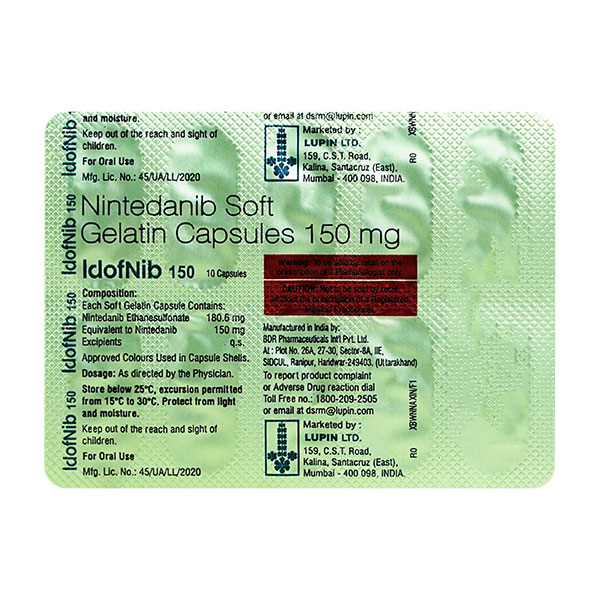

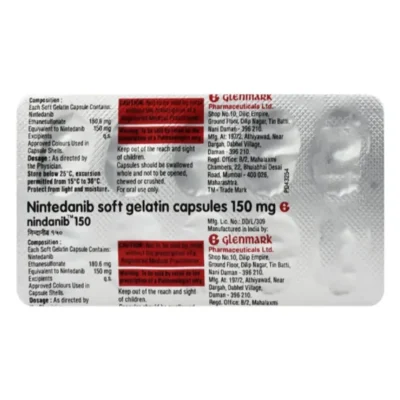
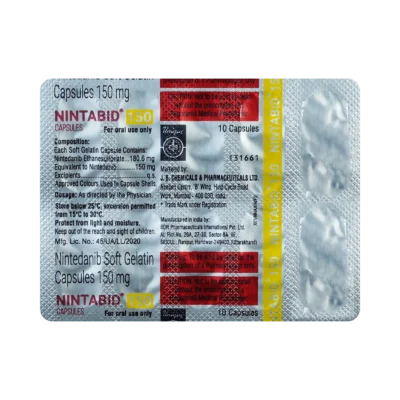
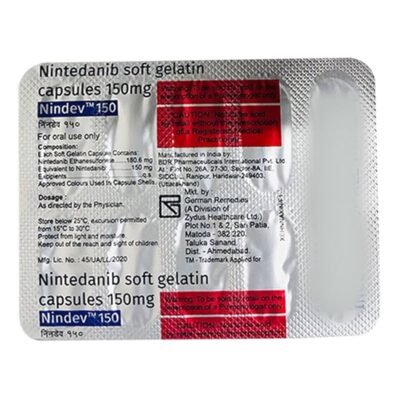
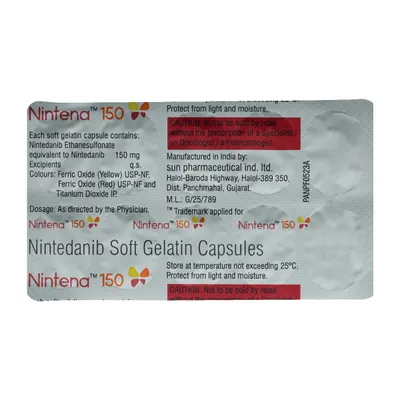
Reviews
There are no reviews yet.